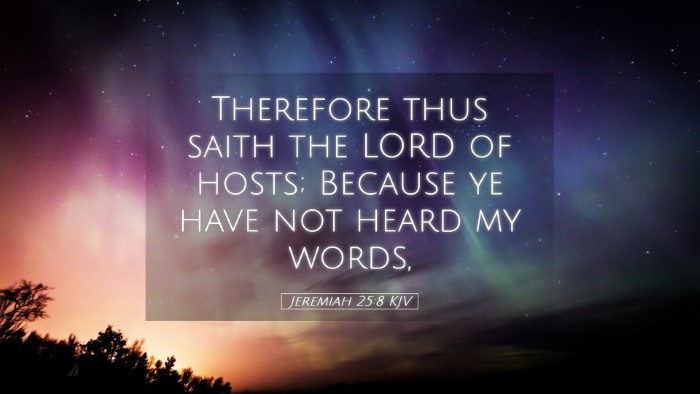Commentary on Jeremiah 25:8
Jeremiah 25:8 states: "Therefore thus says the LORD of hosts: 'Because you have not heard my words,'" (ESV). This verse forms part of a broader discourse where God communicates His impending judgment upon Judah and the nations. The importance of heeding God's message, the consequences of disobedience, and the character of divine judgment are central themes deserving careful exploration.
Introduction
The Book of Jeremiah is often characterized by its poignant messages of warning and hope. In this verse, God addresses the people through Jeremiah, calling out their failure to listen to His guidance. This admonition is crucial not only for the recipients in Jeremiah's day but also resonates with contemporary audiences who encounter similar themes throughout Scripture.
The Context of Jeremiah 25:8
Jeremiah 25:8 must be understood within its historical and theological context. The chapter deals primarily with the impending exile of the Jewish people to Babylon due to their persistent disobedience. God uses Jeremiah as His mouthpiece to declare judgment and to highlight the grave consequences of ignoring divine instruction.
Historical Context
At this time, Judah was embroiled in idolatry and moral decay. Despite numerous calls to repentance through prophetic voices, the people remained obstinate. The exile to Babylon was not merely a punitive measure but also part of God's redemptive plan to bring His people back to a place of faithfulness.
Theological Implications
The appeal to hear God's words underscores the relational aspect of the covenant between God and Israel. It reflects the divine desire for communication and understanding, emphasizing that disobedience leads to separation from God’s blessings.
Insights from Matthew Henry’s Commentary
Matthew Henry emphasizes the significance of God's warnings and the repercussions that follow neglecting them. He draws attention to God's sovereignty as the ultimate authority and how neglecting His words leads to dire consequences.
- Divine Authority: God speaks with authority. His words are not mere suggestions but commands that must be heeded. Henry articulates that to dishonor God's word is to invite His judgment.
- Judgment as a Result: God’s judgment, as elaborated by Henry, is a necessary response to rejected truth. The consequences are severe but arise from a loving Father's desire to correct and restore His children.
- The Importance of Listening: Henry highlights listening to God's words as a vital act of faith. The refusal to hear equates to a dismissal of divine counsel and results in our own downfall.
Insights from Adam Clarke’s Commentary
Adam Clarke offers a detour into the nature of prophecy and the role of the prophet as a communicator of God's will. According to Clarke, Jeremiah's role was pivotal in calling the people back to God's path.
- Prophetic Role: Clarke underscores the burden of a prophet, illustrating how prophetic messages are oftentimes met with resistance. Jeremiah's insistence on proclamation is crucial for the people to recognize their wrongdoings.
- Conditional Prophecy: Clarke notes that prophetic proclamations often come with conditions—calls to repentance and warnings about consequences—as evident in this verse.
- God’s Long-Suffering: Clarke points out the long-suffering nature of God. Despite repeated disobedience, God continues to send His message through Jeremiah, indicating His desire for restoration rather than destruction.
Insights from Albert Barnes’ Commentary
Albert Barnes provides additional depth into the significance of God’s messages and the dire consequences of ignoring them. His commentary reveals the gravity of human responsibility in responding to divine guidance.
- Responsibility of the People: Barnes stresses human accountability in the relationship with God. Ignoring His words is an act of willful rebellion that leads to suffering.
- The Prophetic Voice: He discusses the role of the prophetic voice as a necessary reminder of moral obligation and divine expectations, particularly in a time of spiritual crisis for Israel.
- God’s Promises and Threats: Barnes contrasts God’s promises with the warnings of judgment, illustrating the balance of hope and accountability offered to the people of Israel.
Conclusion
Jeremiah 25:8 serves as a sobering reminder of the necessity of listening to God’s word. The collective insights from Matthew Henry, Adam Clarke, and Albert Barnes provide a rich tapestry of interpretation, illustrating the implications of this verse across time. For pastors, theologians, and students of Scripture, it offers a crucial understanding that reverberates through the ages—our God is both loving and just, desiring our attentiveness to His words as a pathway to restoration rather than judgment.
Encouragement is found in the understanding that even amidst divine chastisement, hope lies in repentance and the promise of restoration. The challenge remains: to heed the voice of God and to walk faithfully in His ways.


